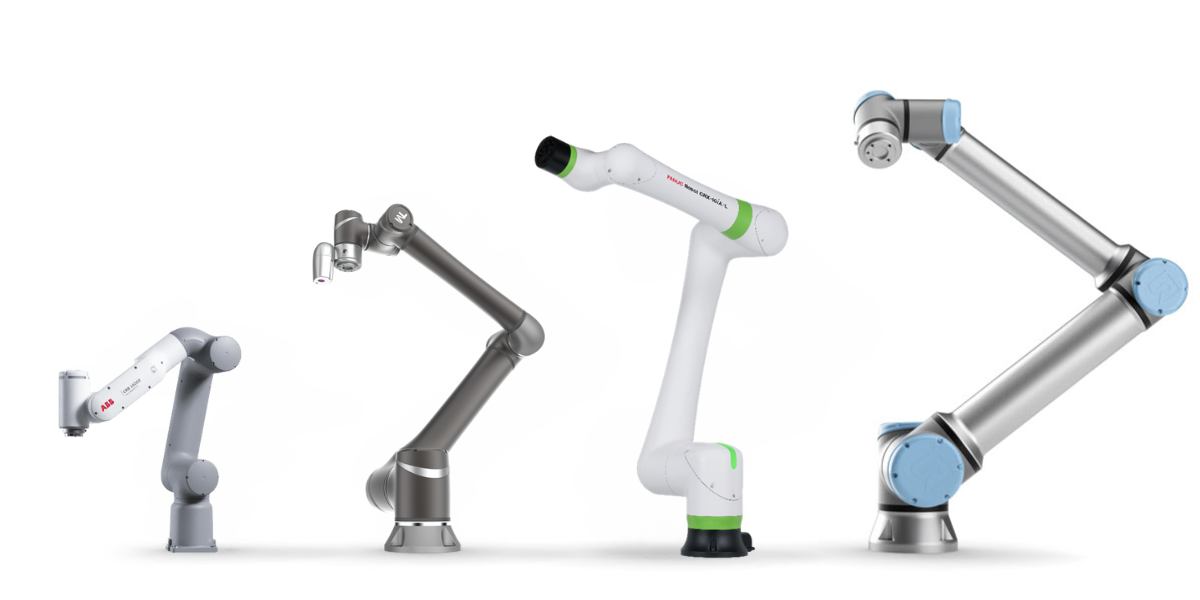The rise of collaborative robotics has transformed the industrial landscape, offering companies a flexible and efficient solution for automating a multitude of tasks.
Choosing the right collaborative robot (or cobot) for your needs can be a complex process. This article compares the leading models from the most popular manufacturers on the market, giving you an insight into their features and functionalities to guide you in your decision.
Popular manufacturers and models
- Universal Robots: Market leader Universal Robots offers a wide range of cobots, including the UR3e, UR5e, UR10e, UR16e and UR20 series. They stand out for their ease of use, flexibility and wide range of applications.
- Fanuc: The Japanese robotics giant offers the CRX series cobots. Renowned for their precision and robustness, they are ideal for repetitive, high-precision tasks.
- Omron: Omron's TM cobot stands out for its compact design and enhanced safety. It is ideal for cramped working environments and applications where human-robot collaboration is tight.
- Yaskawa: Yaskawa's HC series offers a wide variety of cobots to meet different payload and reach requirements. They are appreciated for their performance and reliability.
- ABB: ABB's YuMi cobots stand out for their unique single- and dual-arm design. They excel in complex collaborative tasks and delicate object handling applications. ABB also offers the GoFa and SWIFTI series.
Comparison criteria
- Payload: Determines the robot's ability to lift and handle objects.
- Reach: Determines the working area accessible to the robot.
- Repeatability: Determines the robot's ability to perform precise, repetitive movements.
- Ease of use: Determines how easy it is to program and operate the robot.
- Safety: Determines the robot's built-in safety features to ensure operator protection.
The choice of robot is often influenced by the customer's prior knowledge of the company or programming method. Ease of programming and the speed of the learning curve are also important criteria. Investing in a collaborative robot is an important decision for your company. By carefully comparing the different models and choosing the one that best meets your needs, you can maximize the benefits of collaborative robotics and improve your productivity, safety and profitability. Contact our experts for personalized advice on choosing the ideal collaborative robot for your business.
*Note: This article is a general guide and does not replace an in-depth analysis of your specific needs.
Comparative table of the most popular models
| Manufacturer | Model | Payload | Reach | Repeatability |
|---|---|---|---|---|
| Universal Robots | UR3e | 3 kg | 500 mm | ±0.03 mm |
| Universal Robots | UR5e | 5 kg | 850 mm | ±0.03 mm |
| Universal Robots | UR10e | 12.5 kg | 1300 mm | ±0.05 mm |
| Universal Robots | UR16e | 16 kg | 900 mm | ±0.05 mm |
| Universal Robots | UR20 | 20 kg | 1750 mm | ±0.05 mm |
| Fanuc | CRX-5iA | 5 kg | 994 mm | ±0.03 mm |
| Fanuc | CRX-10iA | 10 kg | 1249 mm | ±0.04 mm |
| Fanuc | CRX-20iA | 20 kg | 1418 mm | ±0.04 mm |
| Fanuc | CRX-25iA | 25-30 kg | 1756-1889 mm | ±0.05 mm |
| Omron | TM5-700 | 6 kg | 700 mm | ±0.05 mm |
| Omron | TM5-900 | 4 kg | 900 mm | ±0.05 mm |
| Omron | TM12 | 12 kg | 1300 mm | ±0.1 mm |
| Omron | TM14 | 14 kg | 1100 mm | ±0.1 mm |
| Omron | TM16 | 16 kg | 900 mm | ±0.1 mm |
| Omron | TM20 | 20 kg | 1300 mm | ±0.1 mm |
| Yaskawa | HC10 | 10 kg | 1379 mm | ±0.05 mm |
| Yaskawa | HC20 | 20 kg | 1900 mm | ±0.05 mm |
| ABB | GoFa CRB 15000 | 5 kg | 950 mm | ±0.05 mm |
| ABB | SWIFTI CRB 1100 | 4 kg | 580 mm | ±0.01 mm |
| ABB | YuMi IRB 14000 | 0.5 kg | 559 mm | ±0.02 mm |
| ABB | Single-arm YuMi IRB 14050 | 0.5 kg | 559 mm | ±0.02 mm |

